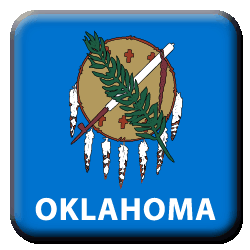Legal Gambling In Oklahoma
An Overview Of The Gambling Laws In The State Of Oklahoma
The gambling laws in Oklahoma are very specific about the legal minimum gambling age for participating in gambling entertainment. All forms of pari-mutuel, charitable, lottery, and tribal gambling (venues not serving alcohol) are legal for players who are at least 18 years of age or older to participate in. In general gambling is considered legal assuming it takes place in a regulated venue and as long as you take note of all the relevant gambling laws in Oklahoma you’ll be clear from the local authorities. Gambling Laws in Oklahoma. The main factor in determining whether a particular game in considered illegal is the “bet” element.
Much of the history of Oklahoma involves the resettlement of Indian tribes from the States to the east. It is the descendants of those resettled tribes who now run the largest tribal casino operations anywhere in the US in Oklahoma. There are currently more than 111 casinos, which create a huge amount of jobs and generate millions in revenues for the State’s coffers. While there are not too many opportunities to gamble outside of the native lands, there almost does not need to be – with such a wide choice of casinos and poker rooms, large and small.
Below you will first see a rapid-paced history of the gambling laws in Oklahoma. This is followed by a look at each of the major forms of gambling in turn, each with a current legal status. After that you’ll find the key excerpts from the State laws, and a timeline of the major updates to the Statutes. Finally there is a short summary of the current situation and look towards the future for this State.
Oklahoma Gambling Laws – A Brief History
The early settlers bought gambling with them to the territory which would become Oklahoma during the early 1800’s. Tales of barely regulated casinos and poker games in saloons with their card-sharps and gunfights would have been the norm here. There were subsequently a lot of forced migrations of native tribes from the East onto Oklahoma lands – which explains why there are so many tribal casinos today. The prevailing view at the time that Oklahoma became a State in 1890 was that gambling was something to be banned on moral grounds. The initial legislation thus bans all gambling which is not explicitly exempted.
Horse-racing was the first form of gambling to be legalized, when pooled (pari-mutuel) betting was made legal in 1982. There are currently 3 major horse racing tracks in Oklahoma, which later benefited from class 2 slots – becoming ‘racinos’.

Charity gambling including bingo and raffle type games was legalized 10 years later. At the same time, the tribes started to offer bingo games from their lands. They wanted a compact to include the class 3 games (casino table games and slot machines), though the State government refused to engage in any negotiations. This lead to a game of legal cat and mouse, with the tribes pushing the boundaries of the definition of class 2 machines ever further – and the State taking them to court to challenge each progression.
The tribes won out, with their games being approved more often than banned, and in 2000 the Oklahoma government finally entered into negotiations. The result was the legalization of class 3 games on native lands in 2002. It did not take many years for the benefits to be felt. There are now $100’s of millions in revenues and huge employment numbers coming from directly from the casinos – as well as the many indirect benefits. Visitors come from neighboring States to visit the mega-casinos of the Choctaw tribe, while 100’s more venues cater for gamblers on a local level. Poker games including tournaments are spread on tribal lands, though there is no carve-out for home-games under the ‘social poker’ banner like you find in many other States.
What Forms Of Gambling Are Legal?
Casino Gaming: Yes, Oklahoma is home to the largest number of Tribal casinos anywhere in the US, you’ll literally be spoiled for choice here with everything from the huge resorts of the Choctaw tribe to smaller regional casinos and high stakes bingo halls. There are no commercial (non-tribal) casinos.
Online Casinos: No, as in many States, the laws were set before the internet, however, they are considered broad enough to outlaw any gambling which is not specifically licensed – which would include online gambling.
Live Poker: Yes, there is a huge choice of poker rooms at the tribal casinos, this includes some big tournament series and events as well as the regular real money games. Social poker games are not carved out under State law – making them technically illegal.
Online Poker: No, there is no indication from the State government that regulation of online poker is being considered.
Sports Betting: Yes, you can bet on horse races (pari-mutuel betting) either at racetracks or remotely. Slots machines and racetracks are combined into popular ‘racinos’.
Lottery Betting: Yes, there is a State lottery in Oklahoma, which includes the inter-State games.
Bingo Games: Yes, charity gaming is carved out and regulated, games falling under this category do need a separate license.
Oklahoma Gambling Laws – Statutes And Legal Timeline
Unlike many States, who go after the organizers of illegal gambling games, Oklahoma also has specific statutes criminalizing players in them. This State makes the bet the subject of criminal proceedings as well as outlawing gambling devices (broadly defined) and profiting from the games via rake or fees. While the bet legislation focuses on games of chance, poker (the only game which could arguably be all skill) is covered under a separate list of illegal gambling games.
Here are the key excerpts:
[su_quote]“Except as provided in the Oklahoma Charity Games Act, every person who opens, or causes to be opened, or who conducts, whether for hire or not, or carries on either poker, roulette, craps or any banking or percentage, or any gambling game played with dice, cards or any device, for money, checks, credits, or any representatives of value…” (From: 21- 941 – Opening, conducting or carrying on gambling game)[/su_quote]
Here is the other crucial definition – that of a bet:
“A “bet” is a bargain in which the parties agree that, dependent upon chance, or in which one of the parties to the transaction has valid reason to believe that it is dependent upon chance, one stands to win or lose something of value specified in the agreement. “
While there is no carve out for social or private gambling games, there is no history of busts in this area. Illegal sports-betting is the area which takes the heat from the Oklahoma law enforcement agencies.
1982: Pari-Mutuel betting on horse races is first legislated for, becoming law in 1983. Each of the 15 counties in Oklahoma has a separate vote on this, with 12 approving. Later off-site betting and gaming machines would be allowed from the 3 major racetracks.
1987: Choctaw Indians first host high stakes bingo games on their land.
1992: First compact signed with the many Oklahoma tribes, this allowed for class 2 games and pari-mutuel horse racing on tribal lands. Class 2 gambling includes bingo or lottery type games including electronic machines. Often games run by computers but with the assistance of live dealers are included in this definition.
1992: Charitable Games Act passed into law, allowing bingo, pull-tab games and other raffles to be held under license of the ‘Alcoholic Beverage Law Enforcement Commission’ (ABLE).
2004: After years of legal battles about the ever improving class 2 gaming, the State sits down to negotiate a compact for class 3 games. This is approved and the environment was made possible for the tribes to expand to the 111+ casinos operating today.
2005: The Oklahoma lottery begins, this was legislated for in 2003, and put to the voters in a referendum in 2004. This lottery now includes inter-State games such as the Powerball.
Oklahoma Gambling Laws – Summary And A Look To The Future
With so many tribal casinos in one place, and compacts which will run until 2020 and be extended if no renegotiation takes place – there is little pressure for Oklahoma to legislate for any further gambling within their borders. The status-quo provides a lot of revenue and employment for the State and large investments are ongoing, making the Choctaw casino complexes especially lavish.
Legal Gambling Age In Oklahoma
The government has yet to say anything about future legislation of online gambling, and in particular poker. It is hard to see how they would be able to introduce this without the tribes being a major part of the negotiation. While tribes elsewhere have shown that they would like to be involved (for example in California), there is a chance that a regulation drive could come from them. I do not expect to see this State regulating quickly, with the most likely outcome a proof of revenue coming from other States before this subject gets raised.
Useful Resources:
Indian Compacts
Legal Gambling Age In Oklahoma
- http://www.gaminglawmasters.com/pdfs/IMGL%20Member%20Article%20Mike%20McBride%205.10.10.pdf
Oklahoma Indian Gaming Association
Legal Gambling Age In Oklahoma Casinos
Charity Gambling Act
State Laws Summary

Oklahoma Compliance FAQs
Statutes (Number 21 Contains Gambling Info, Each Part Downloads A File)